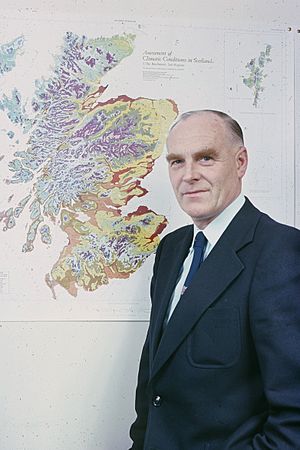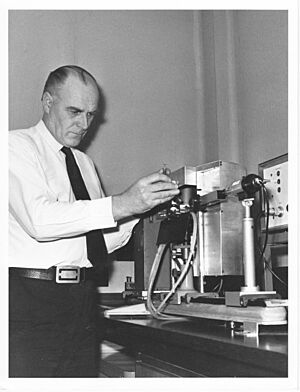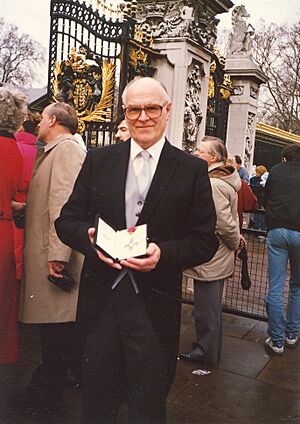Thomas Summers West facts for kids
Quick facts for kids
Thomas Summers West
|
|
|---|---|

Launch of Scotland Land Use Ordnance Survey Maps 1976. Taken at the Macaulay Institute, 1976
|
|
| Born | 18 November 1927 Peterhead, Scotland
|
| Died | 10 January 2010 (aged 82) Lincoln, Lincolnshire, England
|
| Nationality | British |
| Alma mater | Aberdeen University |
| Awards | FRS 1989, CBE 1988, Maison de la Chimie Paris Honorary Member 1985, The Japan Society for Analytical Chemistry Honorary Member 1981, Fellow of the Royal Society of Edinburgh 1979, Slovak-Czech Spectroscopic Society Johannes Marcus Marci Medal 1977, Society for Analytical Chemistry Gold Medal 1977 Chemical Society Chemical Analysis and Instrumentation Medal 1976, Institute of Chemistry Meldola Medal 1956 |
| Scientific career | |
| Fields | Analytical chemistry |
| Institutions | Birmingham University Imperial College London Macaulay Institute Aberdeen |
| Doctoral advisor | Ron Belcher |
| Signature | |
 |
|
Thomas Summers West (born November 18, 1927 – died January 9, 2010) was a very important British chemist. He was known for his amazing work in understanding chemicals and how they react. He made many discoveries that helped improve how scientists study tiny amounts of substances.
Contents
Life and Work
Growing Up and Early Studies
Thomas Summers West was born in 1927 in a town called Peterhead in Scotland. He went to school at Old Tarbat Public School and then Tain Royal Academy. After that, he studied chemistry at Aberdeen University and earned his first degree.
In 1952, he married Margaret Officer Lawson. They had three children together: Ann, Ruth, and Tom.
A Career in Chemistry
In 1949, Thomas West moved to Birmingham University. There, he started doing special research in a field called analytical chemistry. This is where scientists learn to identify and measure different chemicals. He earned his PhD in 1952 and a higher degree, a D.Sc, in 1962.
His hard work paid off! In 1956, he won the Meldola Medal and Prize from the Royal Society of Chemistry. This award was for his great progress in chemistry.
In 1963, he moved to Imperial College in London. He became a professor there in 1965. At Imperial College, he built a famous research team. They were pioneers in new ways to study chemicals using light, like atomic absorption spectroscopy and atomic fluorescence spectroscopy.
Later, in 1975, he became the Director of the Macaulay Institute for Soil Research. He worked there until he retired in 1987. During this time, he also became a member of the Royal Society of Edinburgh in 1979.
Awards and Recognition
Thomas West received many honors for his contributions to science. In 1987, he was made a CBE. This is a special award from the British Queen or King. He also became an honorary professor at Aberdeen University.
He was a leader in many important scientific groups. He was the President of the International Union of Pure and Applied Chemistry (IUPAC) from 1977 to 1979. He also served as President of the Society for Analytical Chemistry and Honorary Secretary of the Chemical Society.
In March 1989, he was chosen to be a Fellow of the Royal Society. This is a very high honor for scientists in the UK. The Royal Society recognized his important work in studying chemicals using light and his discoveries about how certain chemicals react. For example, he found a special way to detect fluoride, which is now used widely. He also developed new methods for studying tiny amounts of substances.
Later Life and Legacy
Thomas West passed away on January 9, 2010, in Lincoln County Hospital. His wife, Margaret, also passed away the next day.
To honor his amazing work, the Royal Society of Chemistry created the Tom West Analytical Fellowship in 2012. This fellowship helps support new scientists in analytical chemistry. The first award was given in 2013 by his children, Ruth Byrd and Tom West.
Images for kids
 | Valerie Thomas |
 | Frederick McKinley Jones |
 | George Edward Alcorn Jr. |
 | Thomas Mensah |







